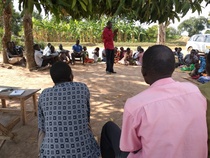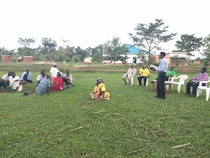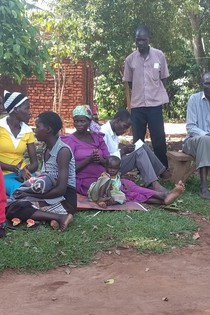By Edmund Okiboko, Managing Director
 |
| UVP intern Augustine engages with community members at an HIV outreach in Kamira. |
Months later, during UVP’s biannual HIV
outreach in the village, Nurse Nalwogo learned of this man’s situation and, as
a long-time partner with UVP, new she needed to attempt to speak to him. She
walked the short distance to his home, less than a 3 minute walk, and said,
“kodi” (knock, knock, anyone home?). Ngobi welcomed Nurse Nalwoga hesitantly.
After traditional greetings and inquiries of the health of family members and
livestock, Nurse Nalwoga gently directed the conversation to the event, visible
from Ngobi’s house. With a little more encouragement, Ngobi agreed to go with Nurse Nalwoga to take an HIV test.
To Ngobi’s surprise, he tested negative for
HIV. He was not convinced of his status by this one test, so he pursued another
one the following week at his local health center. It, too, was negative! Ngobi
was so happy that he visited Nurse Nalwoga at her regular health center in
Namungalwe to share the news. The two rejoiced.
Fast forward six months: UVP is conducting
the second HIV outreach in the village for the year. Ngobi arrives to the event
and immediately seeks out Nurse Nalwoga; her brief visit and encouragement to
test has changed his life. The extra 10 minutes she spent seeking him out,
patiently explaining the benefits of confirming his status, and educating him
on ways to prevent new infections of HIV is how UVP strives to be different.
Health is a journey and there are many influences in each person’s story.
“When UVP started
working closely with our health center, we have also been able to reach out to
villages and interact with the people we serve,” Nurse Nalwoga reflects. By
building relationships with nurses at nearby health centers, UVP breaks down
obstacles keeping rural communities from accessing health services.
Nurse Nalwoga
appreciates UVP’s partnership approach noting that “Uganda Village Project
effectively engages VHTs in all its programming and empowers them to refer
patients to the health center from an informed point of view.”
She adds, “This has also greatly improved on
the knowledge base of community members because they now know where to get
health care services hence, making a difference.”
Ngobi’s
story has been used with his permission, though his name has been changed to
protect his privacy.


































